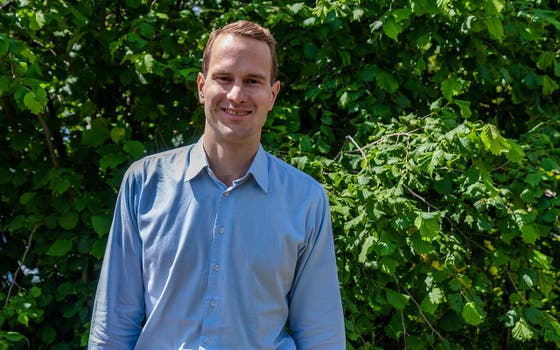Bart Steensma receives prestigious Dekker grant

Bart is working as a postdoc at the UMC Utrecht on a radio stethoscope that can be used to measure whether the heart is deteriorating from the outside. This makes it possible to adjust the treatment of patients with heart failure as early as possible. Even before patients develop additional complaints.
Proper treatment with drugs can prevent heart failure symptoms from recurring or getting worse. But what is the right time to reinstate the medication? Often, patients return to hospital with new symptoms. There, they can examine whether the heart is working worse, and patients can be treated properly. "The tricky thing is that the heart may not be pumping as well as it should before patients notice it," says Bart. "A hospital admission generally deteriorate the prognosis for a patient."
Biomedical engineer Bart Steensma may have a solution to this problem. "I have designed a radio stethoscope with which you can simply measure outside the body how well the blood is flowing through the heart," explains Bart. "I am going to investigate whether this device can measure that the heart is pumping less well even before heart failure patients develop symptoms and have to go to hospital."
Existing technology
The idea originated in corona time and is based on a technique from MRI.
"Using the same radio antennas that are also used in an MRI scanner, we can measure movement outside the MRI scanner, for example the pumping of blood through a heart," Bart explains. "During the corona period I started soldering a prototype based on that principle. A device that patients could use at home. And a second prototype came out of that in the RF Lab at the 7T group. Developing this radio stethoscope is a meticulous process in which Bart must comply with all sorts of legal requirements and the effectiveness of the radio stethoscope must be demonstrated. This is now done in cooperation with the medical technology department.
The Dekker grant of almost €280,000 awarded by the Heart Foundation will give the research a major boost. "A safety study is underway, and we can start involving patients with heart failure in the research and development of this device sooner." The ultrasound scan is one of the current standards for measuring heart function. Bart hopes that the radio stethoscope will eventually produce similar results. Then the use of this device might also become interesting for patients with heart failure who are treated as outpatients.
If this is successful, in a few years time people with heart failure can easily be monitored at home with this device. Doctors will then be able to decide in good time whether, for example, people need to take more medication in order to prevent symptoms. This will improve patients' quality of life but also reduce the number of hospital admissions.
Increasing the impact
At UMC Utrecht, Bart works closely with the principal investigator and professor Nico van den Berg on content. There are already concrete plans to realise a spin-off. Bart is working closely with Utrecht Holdings on this. "I'm interested in technology. What could be better than using technology to contribute to people's health? A spin-off can increase the impact of this project, improving patients' quality of life and reducing the number of hospital admissions. It gives me satisfaction to contribute to this."
